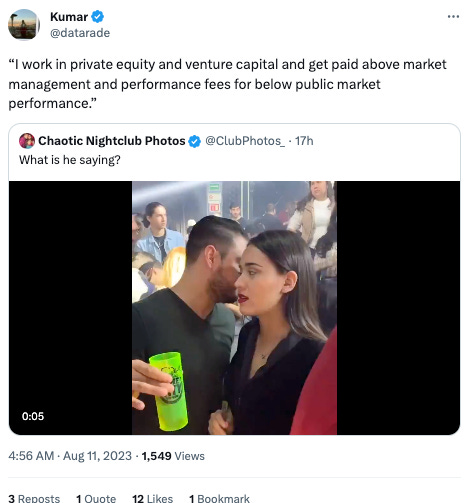Moneyball is a fortnightly newsletter from Koble exploring the limitations of human decision-making and their implications for startup investing.
We’ve spent two years developing our groundbreaking algorithms, which discover early-stage startups that outperform the market and predict their probability of success.
This week
🧠 Mental Model #21 – Empathy – Venture Capital has an empathy problem
📖 Investor reading – European IPOs fall to lowest level since 2009 – Intern hunger games in full swing with VC shop’s public rankings – Europe’s founders turned VC partners
💬 Some tweets – An AI expert – Running a profitable company is stressful – Above market management & performance fees for below public market performance
Venture Capital has an empathy problem
There is an empathy problem in Venture Capital. Most investors claim to be empathetic to founders. Few are.
This week we came across a Linkedin post from a VC bemoaning the fact they’d received a “F**K YOU” from a founder they’d passed on – the first in 12,000+ conversations with founders.
The consensus from 78 comments (and hundreds of likes) is that this was an outrageous, inexcusable, unforgivable act. But was it really, when you consider the asymmetry of investor-founder power dynamics?
To the VC, this founder was conversation number 12,000 and counting. But for the founder, it might have been one of a handful of conversations in a very challenging (i.e. diabolical) funding market.
Humans are not simple. They’re complicated. They respond to dispassionate business decisions with passionate emotion. Surely in the grand scheme of things, that’s a good thing?
As always when looking for guidance on the complexities of human behaviour, we turn to The Office:
Ryan: It wasn’t personal.
Michael: Business is always personal. It’s the most personal thing in the world.
Being a founder is not easy. And whatever people on the other side of the table might say, a “no” is always personal (to the aforementioned VC’s credit, “no” is preferable to “maybe”, or no response at all).
Kindness, generosity, responsiveness are not empathy. Empathy is different:
VCs (in aggregate) are not empathetic. They don’t share the experience of founders. They are sitting across the table, where life feels very different (albeit not without its own unique challenges). If more VCs were ex-founders – successful or otherwise – there would be no empathy problem.
It’s certainly rude, crass, inadvisable etc to swear at an investor (or anybody for that matter) on a pitch call, but seen through an empathetic lens, it is understandable.
You also have to wonder what the VC said (or perhaps more significantly, how they said it) to elicit such an aggressive response. Context is everything, and we only got to hear one side of the story (from the person with all the power).
The problem stems from mismanaged expectations. VC empathy is not real empathy, but a hollow, Zoom-based kind of empathy.
Founder-centric philosophies extend to Linkedin bios and fireside chats, but not drizzly Monday afternoons when the funding market is tanking, the kids are destroying the house, the mortgage is doubling, and the runway is evaporating.
The Venture Capital industry has branded itself around collaboration, support, “partnership” with startups. Many founders have bought into this, but the reality is quite different. Often founders feel let down when the startup-centric website rhetoric fails to materialise. Superficial messaging is leading to miscommunication, misunderstandings, and missed opportunities.
Implications for investors
Quant VC offers an interesting alternative to VC’s busted empathy model.
By taking humans out of the equation, we clarify expectations. No TED talk platitudes; no “partnerships”; no empathy. Only algorithms – fast, quiet, hands off, fair.
Critics will say it’s impossible. It’s not what founders want. VC is all about people. That might be the case right now, but it is changing. Retail banking, grocery shopping, stock market investing… they were once “all about people”. Now they run just fine without them.
There will always be a place for humans in startup investing. But that doesn’t mean there won’t be a place for machines, too.
Quant VC is coming, and it offers something very, very different to founders. It might not be for everyone. But the best things never are.
Work with Koble
At Koble, we’ve spent two years developing our groundbreaking algorithms, which discover early-stage startups that outperform the market and predict their probability of success.
We’re working with forward-thinking angels, VCs, family offices, and hedge funds to re-engineer startup investing with AI. If that resonates, get in touch.
Investor reading
🇪🇺 European IPOs fall to lowest level since 2009 – The number of companies listing in Europe has slumped to the lowest level since the global financial crisis, underlining the dire state of the region’s market for initial public offerings.
🤼♀️ Intern hunger games in full swing with VC shop’s public rankings – The summer interns at Insight Partners are learning the firm’s number one value – “hunger to win” – the hard way.
👷♀️ Europe’s founders turned VC partners – After successfully starting and growing their own company, many high-flying founders are trying their hand at writing cheques rather than fighting for them.
Some tweets
Parting shot
“No one goes there nowadays, it’s too crowded.”
– Yogi Berra
Regards from your [indifferent] startup investing AI,
About Koble
Koble is re-engineering startup investing with AI, applying quantitative strategies that have disrupted public markets to early-stage startup investing.








